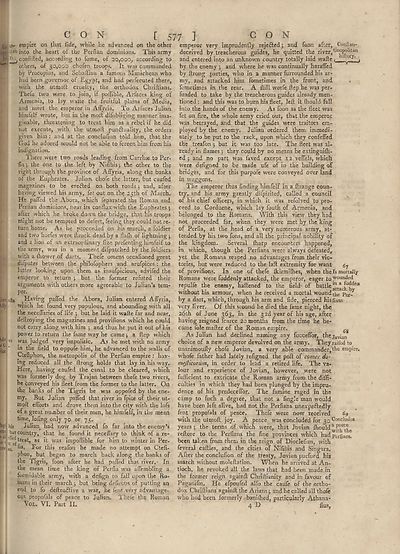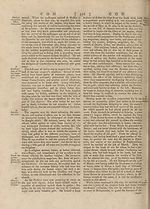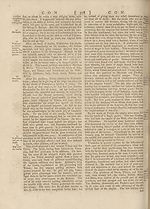Encyclopaedia Britannica, or, a Dictionary of arts, sciences, and miscellaneous literature : enlarged and improved. Illustrated with nearly six hundred engravings > Volume 6, CHI-Crystallization
(623) Page 577
Download files
Complete book:
Individual page:
Thumbnail gallery: Grid view | List view

CON [ 577 ] CON
m« empire on that fide, while he advanced on the other
flitch into the heart oi the Perfian dominions. This army
l^j confifted, according to forme, of 20,000, according to
nJ others, of 30,000 chofen troops. It was commanded
by Procopius, and Sebaftian a famous Manichean who
had been governor of -Egypt, and had perfecuted there,
with the utmoit cruelty, the orthodox Chriftians.
Thefe two were to join, if pofljble, Arlaces king of
Armenia, lo lay watte the fruitful plains of Media,
and meet the emperor in Atfyna. To Arfaces Julian
himfelf wrote, but in the moil difobliging manner ima¬
ginable, threatening to treat him as a rebel if he did
not execute, with the utmoft pun&uality, the orders
given him : and at the conelufion told him, that the
God he adored would not be able to fcreen him from his
indignation.
There were two roads leading from Carrhae to Per-
fia; the one to the left by Nifibisj the other to the
right through the province of AlTyria, along the banks
ot the Euphrates. Julian, chofe the latter, but caufed
magazines to be ere&ed on both roads ; and, after
having viewed his army, let out on the 25th of March.
He paffed the Abora, which feparated the Roman and
Periian dominions, near its conflux with the Euphrates j
after which he broke down the bridge, that his troops
nfight not be tempted to defert, feeing they could not re¬
turn home. As he proceeded on his march, a foldier
and two horfes were {truck dead by a dafti of lightning j
and a lion of an extraordinary fize prefenting himfelf to
the army, was in a moment difpatched by the foldiers
with a fiiower of darts. Thefe omens occafioned great
diiputes between the philofophers and arufpices : the
latter looking upon them as inaufpicious, advifed the
emperor to return j but the former refuted their
arguments with others more agreeable to Julian’s tem¬
per.
Lav!
W)
Idv
oC
sd,
jftc Having paffed the Abora, Julian entered Affyria,
which he found very populous, and abounding with all
the neceflaries of life •, but he laid it watte far and near,
dettroying the magazines and provifions which he could
not carry along with him 5 and thus he put it out of his
power to return the fame way he came} a ftep which
es was judged very impolitic. As he met with no army
in the field to oppofe him, he advanced to the walls of
Ctefiphon, the metropolis of the Perfian empire : hav¬
ing reduced all the ftrong holds that lay in his way.
Here, having caufed the canal to be cleared, which
was formerly dug by Trajan between thefe two rivers,
he conveyed his fleet from the former to the latter. On
the banks of the Tigris he was oppofed by the ene¬
my. But Julian patted that river in fpite of their ut¬
moft efforts and drove them into the city wnth the lofs
of a great number of their men, he himfelf, in the mean
time, lofing only 70 or 75.
his Julian had now advanced fo far into the enemy’s
but country, that he found it neceflary to think of a re-
;ea treat, as it was impoflible for him to winter in Per¬
ris. ^or reafon he made no attempt on Ctefi¬
phon, but began to march back along the banks of
the Tigris, foon after he had paffed that river. In
the mean time the king of Perfia was affembling a
formidable army, with a defign to fall upon the Ro¬
mans in their march ; but being defircus of putting an
end to fo deftrudtive a war, he font very advantage¬
ous propofals of peace to Julian. Thefe the Roman
Vol. VI. Part II.
emperor very imprudently rejected j and foon after, Conitan-
deceived by treacherous guides, he quitted the river,tinoP^tan
and entered into an unknown country totally laid watte t 1
by the enemy ; and where he was continually harafled
by ftrong parties, who in a manner furrounded his ar¬
my, and attacked him fometimes in the front, and .
fometimes in the rear. A ftill worfe ftep he was per-
fuaded to take by the treacherous guides already men¬
tioned : and this was to burn his fleet, left it ftiould fall
into the hands of the enemy. As foon as the fleet was
fet on fire, the whole army cried out, that the emperor
was betrayed, and that the guides were traitors em¬
ployed by the enemy. Julian ordered them immedi¬
ately to be put to the rack, upon which they confefied
the treafon 5 but it was too late. The fleet was al¬
ready in flames; they could by no means be extinguifti-
ed j and no part was faved except 12 veffels, which
were defigned to be made ufe of in the building of
bridges, and for this purpofe were conveyed over land
in waggons.
The emperor thus finding himfelf in a ftrange coun¬
try, and his army greatly difpirited, called a council
of his chief officers, in which it was refolved to pro¬
ceed to Corduene, which lay fouth of Armenia, and
belonged to the Romans. With this view they had
not proceeded far, when they were met by the king
of Perfia, at the head of a very numerous army, at¬
tended by his two fons, and all the principal nobility of
the kingdom. Several (harp encounters happened,
in which, though the Perfians were always defeated,
yet the Romans reaped no advantages from their vic¬
tories, but were reduced to the laft extremity for want gy
of provifions. In one of thefe ikirmifhes, when the Is mortally
Romans were fuddenly attacked, the emperor, eager to
repulfe the enemy, haftened to the field- of battle
without his armour, when he received a mortal wound tiie
by a dart, which, through his arm and fide, pierced hisfians
very liver. Of this wound he died the fame night, the
26th of June 363, in the 32d year of his age, after
having reigned fcarce 20 months from the time he be¬
came foie matter of the Roman empire. ^
As Julian had declined naming any fucceffor, thejovian
choice of a new emperor devolved on the army. They railed to
unanimoully chofe Jovian, a very able commander,the empire,
whofe father had lately refigned the poft of comes </«-
mejlicorum, in order to lead a retired life. The va¬
lour and experience of Jovian, however, were not
fufficient to extricate the Roman army from the diffi¬
culties in which they had been plunged by the impru¬
dence of his predeceffor. The famine raged in the
camp to fuch a degree, that not a fingle man would
have been left alive, had not the Perfians unexpedtedly
fent propofals of peace. Thefe were now received 69
with the utmoft joy. A peace was concluded for 30 Concludi^
years ; the terms of which were, that Jovian ftrould^?^^
reftore to the Perfians the fine provinces which had perfians!
been taken from them in the reign of Dioclefian, with
feveral caftles, and the cities of Nifibis and Singara.
After the conclufion of the treaty, Jovian purfued his
march without moleftation. When he arrived at An¬
tioch, lie revoked all the laws that had been made in
the former reign againft Chriftianity and in favour of
Paganifm. He efpoufed alfo the caufe of the ortho¬
dox Chriftians againft the Allans j and he called all thofe
who had been formerly banifoed, particularly Athana-
4 H fius,
m« empire on that fide, while he advanced on the other
flitch into the heart oi the Perfian dominions. This army
l^j confifted, according to forme, of 20,000, according to
nJ others, of 30,000 chofen troops. It was commanded
by Procopius, and Sebaftian a famous Manichean who
had been governor of -Egypt, and had perfecuted there,
with the utmoit cruelty, the orthodox Chriftians.
Thefe two were to join, if pofljble, Arlaces king of
Armenia, lo lay watte the fruitful plains of Media,
and meet the emperor in Atfyna. To Arfaces Julian
himfelf wrote, but in the moil difobliging manner ima¬
ginable, threatening to treat him as a rebel if he did
not execute, with the utmoft pun&uality, the orders
given him : and at the conelufion told him, that the
God he adored would not be able to fcreen him from his
indignation.
There were two roads leading from Carrhae to Per-
fia; the one to the left by Nifibisj the other to the
right through the province of AlTyria, along the banks
ot the Euphrates. Julian, chofe the latter, but caufed
magazines to be ere&ed on both roads ; and, after
having viewed his army, let out on the 25th of March.
He paffed the Abora, which feparated the Roman and
Periian dominions, near its conflux with the Euphrates j
after which he broke down the bridge, that his troops
nfight not be tempted to defert, feeing they could not re¬
turn home. As he proceeded on his march, a foldier
and two horfes were {truck dead by a dafti of lightning j
and a lion of an extraordinary fize prefenting himfelf to
the army, was in a moment difpatched by the foldiers
with a fiiower of darts. Thefe omens occafioned great
diiputes between the philofophers and arufpices : the
latter looking upon them as inaufpicious, advifed the
emperor to return j but the former refuted their
arguments with others more agreeable to Julian’s tem¬
per.
Lav!
W)
Idv
oC
sd,
jftc Having paffed the Abora, Julian entered Affyria,
which he found very populous, and abounding with all
the neceflaries of life •, but he laid it watte far and near,
dettroying the magazines and provifions which he could
not carry along with him 5 and thus he put it out of his
power to return the fame way he came} a ftep which
es was judged very impolitic. As he met with no army
in the field to oppofe him, he advanced to the walls of
Ctefiphon, the metropolis of the Perfian empire : hav¬
ing reduced all the ftrong holds that lay in his way.
Here, having caufed the canal to be cleared, which
was formerly dug by Trajan between thefe two rivers,
he conveyed his fleet from the former to the latter. On
the banks of the Tigris he was oppofed by the ene¬
my. But Julian patted that river in fpite of their ut¬
moft efforts and drove them into the city wnth the lofs
of a great number of their men, he himfelf, in the mean
time, lofing only 70 or 75.
his Julian had now advanced fo far into the enemy’s
but country, that he found it neceflary to think of a re-
;ea treat, as it was impoflible for him to winter in Per¬
ris. ^or reafon he made no attempt on Ctefi¬
phon, but began to march back along the banks of
the Tigris, foon after he had paffed that river. In
the mean time the king of Perfia was affembling a
formidable army, with a defign to fall upon the Ro¬
mans in their march ; but being defircus of putting an
end to fo deftrudtive a war, he font very advantage¬
ous propofals of peace to Julian. Thefe the Roman
Vol. VI. Part II.
emperor very imprudently rejected j and foon after, Conitan-
deceived by treacherous guides, he quitted the river,tinoP^tan
and entered into an unknown country totally laid watte t 1
by the enemy ; and where he was continually harafled
by ftrong parties, who in a manner furrounded his ar¬
my, and attacked him fometimes in the front, and .
fometimes in the rear. A ftill worfe ftep he was per-
fuaded to take by the treacherous guides already men¬
tioned : and this was to burn his fleet, left it ftiould fall
into the hands of the enemy. As foon as the fleet was
fet on fire, the whole army cried out, that the emperor
was betrayed, and that the guides were traitors em¬
ployed by the enemy. Julian ordered them immedi¬
ately to be put to the rack, upon which they confefied
the treafon 5 but it was too late. The fleet was al¬
ready in flames; they could by no means be extinguifti-
ed j and no part was faved except 12 veffels, which
were defigned to be made ufe of in the building of
bridges, and for this purpofe were conveyed over land
in waggons.
The emperor thus finding himfelf in a ftrange coun¬
try, and his army greatly difpirited, called a council
of his chief officers, in which it was refolved to pro¬
ceed to Corduene, which lay fouth of Armenia, and
belonged to the Romans. With this view they had
not proceeded far, when they were met by the king
of Perfia, at the head of a very numerous army, at¬
tended by his two fons, and all the principal nobility of
the kingdom. Several (harp encounters happened,
in which, though the Perfians were always defeated,
yet the Romans reaped no advantages from their vic¬
tories, but were reduced to the laft extremity for want gy
of provifions. In one of thefe ikirmifhes, when the Is mortally
Romans were fuddenly attacked, the emperor, eager to
repulfe the enemy, haftened to the field- of battle
without his armour, when he received a mortal wound tiie
by a dart, which, through his arm and fide, pierced hisfians
very liver. Of this wound he died the fame night, the
26th of June 363, in the 32d year of his age, after
having reigned fcarce 20 months from the time he be¬
came foie matter of the Roman empire. ^
As Julian had declined naming any fucceffor, thejovian
choice of a new emperor devolved on the army. They railed to
unanimoully chofe Jovian, a very able commander,the empire,
whofe father had lately refigned the poft of comes </«-
mejlicorum, in order to lead a retired life. The va¬
lour and experience of Jovian, however, were not
fufficient to extricate the Roman army from the diffi¬
culties in which they had been plunged by the impru¬
dence of his predeceffor. The famine raged in the
camp to fuch a degree, that not a fingle man would
have been left alive, had not the Perfians unexpedtedly
fent propofals of peace. Thefe were now received 69
with the utmoft joy. A peace was concluded for 30 Concludi^
years ; the terms of which were, that Jovian ftrould^?^^
reftore to the Perfians the fine provinces which had perfians!
been taken from them in the reign of Dioclefian, with
feveral caftles, and the cities of Nifibis and Singara.
After the conclufion of the treaty, Jovian purfued his
march without moleftation. When he arrived at An¬
tioch, lie revoked all the laws that had been made in
the former reign againft Chriftianity and in favour of
Paganifm. He efpoufed alfo the caufe of the ortho¬
dox Chriftians againft the Allans j and he called all thofe
who had been formerly banifoed, particularly Athana-
4 H fius,
Set display mode to:
![]() Universal Viewer |
Universal Viewer | ![]() Mirador |
Large image | Transcription
Mirador |
Large image | Transcription
Images and transcriptions on this page, including medium image downloads, may be used under the Creative Commons Attribution 4.0 International Licence unless otherwise stated. ![]()
| Permanent URL | https://digital.nls.uk/193015522 |
|---|
| Attribution and copyright: |
|
|---|
| Description | Ten editions of 'Encyclopaedia Britannica', issued from 1768-1903, in 231 volumes. Originally issued in 100 weekly parts (3 volumes) between 1768 and 1771 by publishers: Colin Macfarquhar and Andrew Bell (Edinburgh); editor: William Smellie: engraver: Andrew Bell. Expanded editions in the 19th century featured more volumes and contributions from leading experts in their fields. Managed and published in Edinburgh up to the 9th edition (25 volumes, from 1875-1889); the 10th edition (1902-1903) re-issued the 9th edition, with 11 supplementary volumes. |
|---|---|
| Additional NLS resources: |
|

